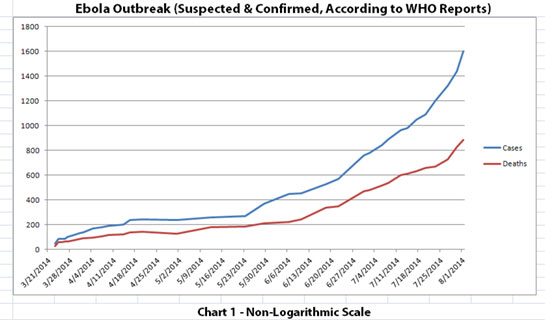Because of the unusual transmission characteristics of this version of Ebola, it will be almost impossible to prevent spread of the fever outside of Africa. This is looking like the worst plague the world has faced since the Spanish flu killed an estimated 50 million in 1919-20. Check out this post from a few days ago -
Two suspected Ebola patients flee hospital in Saudi Arabia – Nigerian doctor, released and said recovered from Ebola drops dead – virus may have mysterious latent triggers
and this from today -
Patient checked for Ebola virus at Kaiser hospital in Sacramento
Posted by The Extinction Protocol

August 2014 – AFRICA - (Aug 20th) – There is no end in sight to the Ebola outbreak in West Africa, according to the head of the World Health Organization. “No one is talking about an early end to the outbreak,” writes Margaret Chan, director-general of the World Health Organization, in today’s New England Journal of Medicine. She says the outbreak is likely to last “many more months.” Chan blames the size and severity of the outbreak – which has killed 1,350 people – on poverty. At least 2,473 people have been diagnosed with the virus. “The hardest-hit countries – Guinea, Liberia and Sierra Leone – are among the poorest in the world,” Chan writes. “They have only recently emerged from years of conflict and civil war that have left their health systems largely destroyed or severely disabled and, in some areas, left a generation of children without education.” Ebola is one of a half-dozen major disease outbreaks recently caused by war or the devastation left behind by conflict, says Peter Hotez, president of the Sabin Vaccine Institute and founding dean of the National School of Tropical Medicine at Baylor College of Medicine in Houston. In Syria, for example, health workers have diagnosed 36 cases of polio since the beginning of the civil war. In Guinea, Liberia and Sierra Leone, “there is no confidence in government or its ability to respond,” Hotez says. “This is all a consequence of public health breakdown.” In West Africa, only one or two doctors are available for every 100,000 people, Chan writes, and “even hospital capacity for infection control is virtually non-existent.” Nearly 160 health workers have been infected, and 80 have died, Chan writes.
Poverty also has driven the spread of the Ebola virus by forcing people to cross borders to find work. The intersection of these three countries is the “designated hot zone,” she writes. In Guinea, about 60% of cases are linked to burial practices, in which family members wash the bodies of the dead, Chan writes. The Centers for Disease Control and Prevention has sent workers to West Africa to help identify cases and trace their contacts, so exposed people can be closely monitored. Lack of education has amplified fear of the disease, leading some people to flee treatment centers or hide infected family members, which allows the disease to spread, Chan writes. That’s made the greatest risk of infection come not from people diagnosed with Ebola but from “delayed detection and isolation,” CDC Director Thomas Frieden writes in an accompanying editorial.
“Every day that disease transmission remains uncontrolled, the likelihood of spread to unaffected countries increases,” he writes. “If a single case is missed … another chain of transmission can start.” Rumors spread quickly, allowing some people to succumb to alleged miracle cures. Chan notes that at least two Nigerians died after drinking saltwater, which was said to protect them from Ebola. Beyond combating the outbreak, Frieden says, the United States should help “put systems in place to prevent another one.” The United States joined the WHO in launching the Global Health Security Agenda, which aims to help countries prevent outbreaks, as well as detect them and respond quickly. The plan addresses threats from new viruses, such as bird flu, as well as bioterrorism. Hospitals in the USA are far better prepared than those in West Africa to contain an Ebola infection, Hotez says. Though an infected patient could travel to the USA on a plane, Hotez says, routine infection control practices would not allow the disease to spread widely. –USA Today
